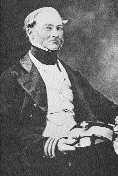Henry Wolsey Bayfield
| Henry Wolsey Bayfield | |
|---|---|
 Henry Wolsey Bayfield | |
| Born |
21 January 1795 Kingston-upon-Hull, England |
| Died |
10 February 1885 Charlottetown, Prince Edward Island |
| Allegiance |
United Kingdom of Great Britain and Ireland |
| Service/branch |
|
| Rank |
Admiral on retired list, Vice Admiral |
Admiral Henry Wolsey Bayfield (21 January 1795 – 10 February 1885) was a British naval officer and surveyor.[1] [2]
Early life and career
Bayfield was born in Kingston-upon-Hull, to John Wolsey Bayfield and Eliza Petit.[1] His family was an ancient one, who at one time lived at Bayfield Hall in Norfolk.[3] While his education is unknown,[1] he joined the Royal Navy on 6 January 1806 at the age of 10, as a volunteer on HMS Pompee. That same year, he was on the ship when it defeated a French privateer. At Cádiz, he was transferred to HMS Queen, and shortly after to HMS Duchess of Bedford. In this particular ship, he was wounded in a battle with two Spanish ships near Gibraltar; for his good work in this episode, he was transferred as a first class volunteer to HMS Beagle, on 29 September 1806, on which over the next four years he was involved in a number of battles.[3] He was rated midshipman in 1810,[1] and saw Canada for the first time in the same year, at the age of 15.[4] In April 1811, he took command of HMS Wanderer,[3] and worked in many different places, including the coast of North America, the West Indies and Spain.[5] He was commissioned as a lieutenant on 20 March 1815, and in the summer of 1816 assisted Captain William Fitz William Owen in surveying various Canadian rivers and lakes.[1] There are works in the art collection of the Royal Military College of Canada by Admiral Henry Wolsey Bayfield (1795-1885).[6]
Admiralty surveyor
In June 1817, Bayfield was made the admiralty surveyor for North America.[7] He surveyed Lake Superior, Lake Erie and Lake Huron, among many others.[5] After several years surveying the lakes in North America, he returned to England in the autumn of 1825, and completed several charts of the lakes.[1] He was promoted commander in 1826, and the following year, he travelled to Quebec to complete surveys of the St Lawrence River.[4]
Later career
Bayfield was promoted to captain on 4 June 1834,[5] and on 2 April 1838, he married Fanny, who was the only daughter of General Charles Wright; they had six children together.[1] In 1841 his headquarters were moved to Charlottetown, Prince Edward Island, so that the survey could be continued. On 21 October 1856, he was promoted Rear Admiral of the Blue,[5] and subsequently Rear Admiral of the White on 8 December 1857,[8] Rear Admiral of the Red on 9 August 1861,[9] and Vice Admiral of the Blue on 27 April 1863,[10] and Vice Admiral of the Red on 11 January 1864.[11] He retired on 31 March 1866,[12] and was promoted admiral on the retired list on 18 October 1867.[13] Over a period of over 20 years, he wrote a book entitled Sailing directions for the Gulf and River of St. Lawrenc, that was published in instalments. It was later republished in 1860 as The St. Lawrence pilot. The city of Bayfield is named after him,[4] as have been several ships owned by the Canadian Hydrographic Service.[1] He died in Charlottetown on 10 February 1885, at the age of 90.[14]
References
- ↑ 1.0 1.1 1.2 1.3 1.4 1.5 1.6 1.7 McKenzie, Ruth (2000). "Dictionary of Canadian Biography Online". Dictionary of Canadian Biography. Retrieved 2008-10-17.
- ↑ Boulton, John George (1910). "On Admiral Bayfield". Transactions, New Series (Literary and Historical Society of Quebec) 28. Retrieved 28 April 2013.
- ↑ 3.0 3.1 3.2 Morgan, Henry James (1862). Sketches of Celebrated Canadians. Hunter, Rose & co. p. 480.
- ↑ 4.0 4.1 4.2 "Henry Bayfield". Bayfield Wisconsin. Retrieved 2008-10-17.
- ↑ 5.0 5.1 5.2 5.3 Morgan, p.481
- ↑ Kamille Parkinson, PhD 'An Impressive Art Collection at RMCC' (Kingston, E-veritas, 25 June 2012
- ↑ Wallace, W. Stewart (1948). The Encyclopedia of Canada, Vol. I. Toronto: University Associates of Canada. p. 191.
- ↑ The London Gazette: no. 22071. p. 4367. 11 December 1857. Retrieved 2008-10-20.
- ↑ The London Gazette: no. 22537. p. 3316. 9 August 1861. Retrieved 2008-10-20.
- ↑ The London Gazette: no. 22730. p. 2246. 28 April 1863. Retrieved 2008-10-20.
- ↑ The London Gazette: no. 22806. p. 157. 12 January 1864. Retrieved 2008-10-20.
- ↑ The London Gazette: no. 23094. p. 2190. 3 April 1866. Retrieved 2008-10-20.
- ↑ The London Gazette: no. 23315. p. 5665. 25 October 1867. Retrieved 2008-10-20.
- ↑ The London Gazette: no. 25546. p. 87. 5 January 1886. Retrieved 2008-10-20.
|